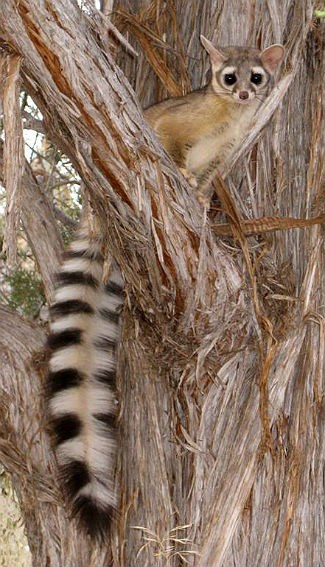Raccoon (Procyon lotor)

Raccoons are gray, medium-sized mammals with wide faces, distinctive “bandit” masks, and long, ringed tails. They have rotund bodies that can measure up to 36 inches long. Their tails are a third again that length. A mature male can weigh as much as 55 pounds! Because they are agile, excellent climbers, intelligent, and willing to eat just about anything, they are found in many habitats, from urban alleys to wilderness. They are primarily nocturnal.
For more information about Raccoons, go to: Raccoon Facts (PBS Nature)
Also worth knowing: Procyonidae are tree climbing mammals that usually have conspicuous markings on their faces and tails. The word lotor, means to wash, and refers to the way Raccoons appear to wash their food before eating it. Raccoons were once considered members of the Bear family, hence their old nicknames, “Washer Bears” and “Long-tailed Bears.” Today, we sometimes refer to them humorously Trash Pandas because of their habit of raiding trash cans and dumpsters.
Ringtail Cat – (Bassariscus astutus)

Ringtail Cats, also called Miners’s Cats or simply Ringtails, are members of raccoon family. They are not related to cats or to Lemurs, which they resemble. They are native to south west Colorado, but they are being seen more frequently in other parts of Colorado, including in the Bear Creek Watershed, almost always near rivers or streams.
Ringtails are brown with lighter brown tummies. They have pointed muzzles and ears, long whiskers and huge, dark eyes which give them their cuddly, stuffed animal appearance. They are about the same size as a small house cat, with mature Ringtails ranging from 12 to 17 inches long and weighing up to 3 pounds. Their long black and white “ringed” tails are about the same length as their bodies. They eat a wide variety of fruits, vegetables, and small animals, including eggs and small birds. They are nocturnal.
Ringtails are excellent climbers. Their tails help them balance in the precarious places and can even do cartwheels to get around in tight spaces!
For more information about Ringtails go to: Animal Fact Sheet: Ringtail (Arizona-Sonora Desert Museum)